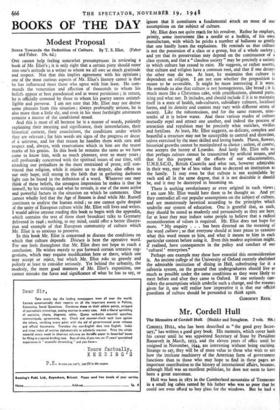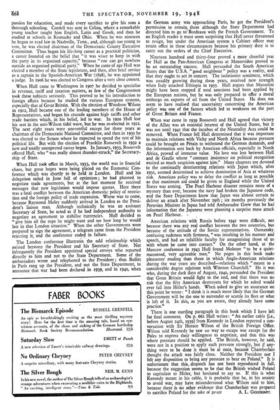Mr. Gorden Hull
CORDELL HULL, who has been described as " the good grey Secre- tary," has written a good grey book. His memoirs, which cover both his career until he was appointed Secretary of State by President Roosevelt in March, 1933, and the eleven years of office. until he resigned in November, 1944, are interesting without being exciting. Strange to say, they will be of more value to those who wish to see how the intricate machinery of the American form of government functions than to those who may hope to find in these pages an important contribution to the history of international affairs, because, although Hull was an excellent politician, he does not seem to have been a great statesman.
Hull was born in 1871 in the Cumberland mountains of Tennessee in a small log cabin rented by his father who was so poor that he could not even afford to buy glass for the windows. But he had a
passion for education, and made every sacrifice to give his sons a thorough schooling. Cordell was sent to Celina, where a remarkable young teacher taught him English, Latin and Greek, and then he studied at schools in Kentucky and Ohio. When he was nineteen he began to read law in Nashville, Tenn., and, although too young to vote, he was elected chairman of the Democratic County Executive Committee. Thus began his life-long career as a practical politician, a career founded on the belief that " it was wiser to keep in with the party in its organised capacity," because " cne can get nowhere outside an organised political party." When he came of age Hull was elected a member of the State legislature, and then, after brief service as a captain in the Spanish-American War (1898), he was appointed a judge. In 1906 he was elected to Congress after a very close contest.
When Hull came to Washington in 1907 he decided to specialise in revenue, tariff and taxation matters, as few of the Congressmen took these subjects seriously. This proved to be his introduction to foreign affairs because he studied the various European systems, especially that of Great Britain. With the election of Woodrow Wilson in 1912, Hull became one of the leading members of the House of Representatives, and began his crusade against high tariffs and other trade barriers which, in his belief, led to war. In 1920 Hull lost his seat in the anti-Wilson tidal wave, but he was re-elected in 1922. The next eight years were uneventful except for three years as chairman of the Democratic National Committee, and then in 1930 he was elected to the Senate where he expected to spend the rest of his political life. But with the election of Franklin Roosevelt in 1932 a new and totally unexpected career began. In January, 1933, Roosevelt offered Hull, who " was really almost thunder-struck," the Secretary- ship of State.
When Hull took office in March, 1933, the world was in financial chaos, but great hopes were being placed on the Economic Con- ference which was shortly to be held in London. Hull and his delegation sailed in June full of optimism ; he had planned to negotiate trade agreements, but at the last moment he received messages that new legislation would impose quotas. Here there was a fatal conflict between the American domestic policy of restric- tion and the foreign policy of trade expansion. Worse was to come, because Raymond Moley suddenly arrived in London as the Presi- dent's liaison man. Although technically he was an assistant Secretary of State, he acted as if he had independent authority to negotiate an agreement to stabilise currencies. Hull decided to " give him all the rope he might want and see how long he would last in that London situation." When the other Governments were prepared to sign the agreement, a telegram came from the President rejecting it, and the conference ended in failure.
The London conference illustrates the odd relationship which existed between the President and his Secretary of State. Not infrequently the President appointed special envoys who reported directly to him and not to the State Department. Some of the ambassadors wrote and telephoned to the President • thus Bullitt in Paris rang up the President, and not the State Department, to announce that war had been declared in 1939, and in 1940, when
the German army was approaching Paris, he got the President's permission to remain, there although the State Department had directed him to go to Bordeaux with the French Government. To an English reader it must seem surprising that Hull never threatened to resign, but under the American system a Cabinet officer may retain office in these circumstances because his primary duty is to carry out the orders of the Chief Executive.
Nineteen hundred and thirty-four proved a more cheerful year for Hull as the Pan-American Congress at Montevideo proved to be an outstanding success. Hull persuaded the South American States that The U.S.A. " good neighbour " policy was a reality, and that they ought to act in concert. The isolationist sentiment, which was steadily growing during these years, received new strength when Italy attacked Ethiopia in 1935. Hull argues that Mussolini might have been stopped if total sanctions had been applied by the European nations, but he was only prepared to offer a moral embargo on exports of oil from the United States. He does not seem to have realised that uncertainty concerning the American policy was one of the factors which led to weakness on the part of Great Britain and France.
When war came in 1939 Roosevelt and Hull agreed that victory of the Allies was an essential interest of the United States, but it was not until 1941 that the incubus of the Neutrality Acts could be removed. When France fell Hull determined that it was important to maintain relations with Vichy and North Africa because pressure could be brought on Petain to withstand the German demands, and the information sent back by American officials, especially in North Africa, proved of immense value. No love was lost between Hull and de Gaulle whose " constant insistence on political recognition excited so much suspicion against him." Many chapters are devoted to the continually deteriorating relations with Japan which, after 1931, seemed determined to achieve domination of Asia at whatever risk. American policy was to delay the conflict as long as possible so that maximum aid could be given to England while the United States was arming. The Pearl Harbour disaster remains more of a mystery than ever, because the navy had broken the Japanese code, and the State Department knew that Japan was almost certain to deliver an attack after November 29th ; six months previously the Peruvian Minister in Japan had told Ambassador Grew that he had information that the Japanese were planning a surprise mass attack on Pearl Harbour. .
American relations with Russia before 1941 were difficult, not because there was any real conflict between the two countries, but because of the attitude of the Soviet representatives. Oumansky. confusing rudeness with firmness, "was insulting in his manner and speech, and had an infallible faculty for antagonising those of us with whom he came into contact." On the other hand, at the Moscow conference in 1943 Hull found Molotov " to be a quiet- mannered, very agreeable man." No pages in this book make pleasanter reading than those in which Anglo-American relations during the war years are described—relations which " meant to a considerable degree relations with Winston Churchill." He it was who, during the dark days of August, 1940, persuaded the President that Great Britain would fight to the end, and that there was no risk that the fifty American destroyers for which he asked would ever fall into Hitler's hands. When asked to give an assurance on this point he wrote : " I think it is much more likely that the German Government will be the one to surrender or scuttle its fleet or what is left of it. In this, as you are aware, they already have some practice."
There is one startling paragraph in this book which I have left for final comment. On p. 662 Hull writes : "An earlier cable [i.e., before August 24th, 19391 from Kennedy in London reported a con- versation with Sir Horace Wilson of the British Foreign Office. Wilson told Kennedy he saw no way to escape war except for the Poles to express their willingness to negotiate, and that this was where pressure should be applied. The British, however, he said, were not in a position to apply such pressure strongly, but if any- thing were to be done it must be at once, because Chamberlain thought the attack was fairly close. Neither the President nor I felt any disposition to bring any pressure to bear on Poland." It is unfortunate that this. dispatch has not been reproduced in full, because the suggestion seems to be that the British wished Poland to capitulate to Hitler, but hesitated to say so. If this is what Kennedy meant in his cable, it is probable that he, in his anxiety to avoid war, may have misunderstood what Wilson said to him, because there is no other evidence that Chamberlain was prepared to sacrifice Poland for the sake of peace A. L. G0ODHART.



































 Previous page
Previous page